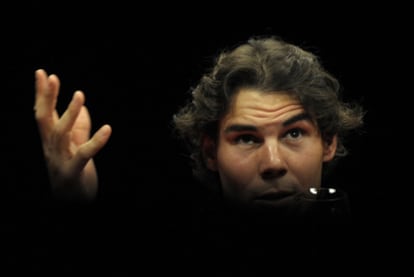Rafael Nadal: "I have become too predictable"
Tennis world number two plots to bring back intensity in 2012 challenge to Djokovic supremacy
Relaxing during the off-season in his familiar lair, Rafael Nadal is seated on the terrace of his old tennis club in Manacor, on the island of Mallorca. This is where the child Rafa learned what was to be his trade, once professional soccer had been ruled out, and he cannot resist turning his gaze toward a match being played by a couple of fortysomething amateurs.
The season that finished with some stinging defeats at the World Tour Finals in London last month can hardly be considered a bad one by any standards, especially as it ended with Nadal leading Spain to Davis Cup victory over Argentina. But a series of defeats at the hands of Serbia's Novak Djokovic, who took away the Spaniard's Wimbledon and US Open titles, plus the world number-one ranking, have plunged Nadal into a philosophical mood.
"Will I recover my game by January? Maybe not, but I have to get it back by April"
Question. How much did those losses to Djokovic hurt you?
Answer. With each year that passes, one loses a little intensity. The intensity of your faith in yourself, in your concentration, in being positive and believing that things will work out... these things are all in the mind. Over time you lose this a little. Competition burns you out. I have spent seven years in the top two in the world, almost constantly. It's like when they say I get a lot of injuries. I don't get injured a lot.
Q. I was asking about your mind more than your physique.
A. My head was good during the first half of the year, not perfect, because I lacked that little bit extra in those matches against Djokovic. But it was alright: I accepted [the defeats], I went back to work, to fight. But clearly, the standard of my tennis came up a bit short. When your game is on, your mind responds better. I could have been less predictable in my game; I was too predictable at many times in the season. These are the things I have to get right for 2012. Will I recover all that by January? Maybe not, but I have to get it back by April.
Q. The challenge is not just to win matches, but tournaments.
A. I am talking about me winning; not depending on the rest, but on myself. I have realized that this year I won a lot of matches, but too often I was more concerned about what my opponent was doing than myself. Often, I had the feeling that I was not in control of the match.
Q. What do you need to change to beat Djokovic?
A. To go that bit further I need to play inside the baseline and apply more pressure. [In the US Open final] I pressured him at times, whereas before I had the feeling that he was dominating each point. Then it was head to head. It was an extremely hard match. I could win or lose it, but I had to at least push myself to the limit. To get to that point, I have to do that in all the other matches, to be more aggressive and make that my usual level, so I don't then have to try to exceed that. In 2001, there were moments in which I was lacking that bit extra. It's only the second time in my whole career that I have made three Grand Slam finals [winning the French Open against Roger Federer]. You have to appreciate that. I mean, in how many seasons have I reached 10 finals? What's more, Spain ended up winning the Davis Cup. The year was a good one, but the level of expectation, both from my part and externally, is very high. [...] Now I have to get back up to cruising speed, and make it even higher. From Indian Wells all the way to Wimbledon and the London Olympics, that's where I need to get back to my best.

Defense of Davis stance
Shrugging off the idea that there is some concealed personal issue behind his decision to not play for Spain in the 2012 Davis Cup under newly named captain Álex Corretja, Nadal sets the record straight. "Before saying anything in public, I went to see the International Federation and explained the situation to them: 'You're committing suicide.' That's the truth and I don't say that to suit my own agenda. [...] They're not favoring a tournament that it is special. They're making no effort to improve it, and I can't understand it. It's not just something to make money out of. Why don't they have a Davis Cup that lasts two years, with two rounds one year and two more the next? Because it is not good economically. When a competition runs yearly for so long and all the best players aren't there, it loses value."
Tu suscripción se está usando en otro dispositivo
¿Quieres añadir otro usuario a tu suscripción?
Si continúas leyendo en este dispositivo, no se podrá leer en el otro.
FlechaTu suscripción se está usando en otro dispositivo y solo puedes acceder a EL PAÍS desde un dispositivo a la vez.
Si quieres compartir tu cuenta, cambia tu suscripción a la modalidad Premium, así podrás añadir otro usuario. Cada uno accederá con su propia cuenta de email, lo que os permitirá personalizar vuestra experiencia en EL PAÍS.
¿Tienes una suscripción de empresa? Accede aquí para contratar más cuentas.
En el caso de no saber quién está usando tu cuenta, te recomendamos cambiar tu contraseña aquí.
Si decides continuar compartiendo tu cuenta, este mensaje se mostrará en tu dispositivo y en el de la otra persona que está usando tu cuenta de forma indefinida, afectando a tu experiencia de lectura. Puedes consultar aquí los términos y condiciones de la suscripción digital.








































